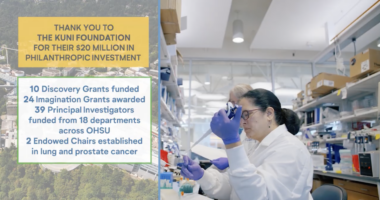
Grants Help to Advance Cancer Research and Advocacy and Inclusive, Affordable Housing
for People with Intellectual Disabilities
President Joe Biden announced his revitalized Cancer Moonshot program last week, just as World Cancer Day brought awareness to cancer prevention, detection, and treatment. Locally, the Kuni Foundation awarded 15 grants to organizations throughout Washington and Oregon that will accelerate cancer research and increase access to affordable housing for adults with intellectual and developmental disabilities (IDD).
“We are committed to closing funding gaps that impact underserved communities and initiatives, and these grants support bold new approaches to cancer research, address funding disparities for cancers impacting women and advance affordable housing for some of our community’s most vulnerable members,” said Greg Goodwin, Board Chair of the Kuni Foundation.
Accelerating Cancer Research to Improve Detection, Explore New Treatments
Oregon Health & Science University
Researchers at Oregon Health & Science University (OHSU) received more than $3.3 million to support four diverse efforts that will revolutionize personalized cancer therapy, develop new strategies for breast cancer treatment and resistant melanoma and amplify ovarian cancer research, one of the deadliest cancers for women with a mortality rate that has not improved in more than 30 years.
Funding will help OHSU researchers identify new, more effective therapies for metastatic triple-negative breast cancer, which is nearly twice as common in African American and Hispanic women. This form of cancer will affect more than 200,000 patients in Washington and Oregon during their lifetime. Given its resistance to existing therapies, patients typically survive less than a year and a half after diagnosis.
OHSU researchers are also focused on new treatments for melanoma that could potentially be applied to other cancers. Melanoma is the fifth most common cancer in the nation. Oregon and Washington have higher rates of melanoma than the national average, including a prevalence of late-stage diagnosis and poorer outcomes in rural areas. There are currently few treatment options for patients who don’t respond or develop resistance to treatment.
“The OHSU Knight Cancer Institute is grateful for the continued support from the Kuni Foundation,” said Brian Druker, M.D., Director of the OHSU Knight Cancer Institute. “Their generosity helps fund bold new research endeavors and supports our efforts to end cancer as we know it.”
Providence Cancer Institute
Metastatic cancers cause approximately 90% of cancer-related deaths in the United States, and Adoptive Cell Therapy (ACT) has shown promise through harnessing a patient’s own cancer-fighting T cells. Kuni awarded a $400,000 grant to Providence Cancer Institute to support a more impactful ACT delivery by creating armies of “younger” cancer-fighting T cells that target a tumor’s self-defense mechanisms.
Fred Hutchinson Cancer Research Center
More than 130,000 people died of lung cancer last year in the United States, the leading cause of cancer-related deaths. Small Cell Lung Cancer (SCLC) is among the most aggressive of all tumor types and is usually metastatic by the time a person is diagnosed. With no targeted treatment and only modest improvements in 40 years, the National Cancer Institute recognized the scarcity of research dedicated to improving SCLC outcomes. Fred Hutchinson Cancer Research Center received a $750,000 grant to support an investigational therapy and improved early detection.
UW Medicine
Four projects at UW Medicine received more than $3.3 million to explore new therapies and improve patient outcomes and access. Research exploring the dosage and frequency of immunotherapy could revolutionize the use of this treatment by improving patient safety, dramatically reducing treatment costs, and making immunotherapy more accessible and equitable. The foundation also awarded funds to develop a new type of chemotherapeutics to fight cancer that could benefit a broad population of cancer patients, regardless of their cancer type, gender and age.
Building on a pilot previously supported by the Kuni Foundation, a $1 million grant supporting the use of FLASH radiation will advance the next stage of research, paving the way for clinical trials. And, given the prevalence of melanoma in the Pacific Northwest, researchers received funding to explore a new approach that suppresses melanoma growth and overcomes treatment resistance.
“We are grateful to the Kuni Foundation for catalyzing bold and collaborative cancer research in the Pacific Northwest,” said Paul G. Ramsey, MD, CEO of UW Medicine. “These generous grants to UW Medicine researchers fund a spectrum of research –– from pioneering, innovative treatment to testing new protocols to reduce patient financial burden –– which will ultimately make cancer care more equitable and effective.”
Increasing Access to Affordable, Inclusive Housing
The Kuni Foundation awarded five grants to organizations leading innovative efforts in response to the affordable housing crisis that the IDD community faces. A report released by the Kuni Foundation in 2020 indicates that more than 24,000 people in the Pacific Northwest face housing insecurity and risk homelessness. The foundation awarded more than $1.9 million to advance new housing in urban and rural areas of the region and support advocacy focused on securing more resources and housing for the IDD community.
Edwards Center and Horizon Project
Beaverton-based Edwards Center received $300,000 to help complete an inclusive housing model, enabling adults with IDD and their parents to live together in a pocket neighborhood. The center allows everyone to age in place while receiving support and social connection. Horizon Project, based in Milton-Freewater, received a $220,000 grant to support creating the HPI STEP Center for Independent Living, which helps youth and adults obtain the skills and confidence they need to live independently. Funding will provide the down payment to purchase a building, allowing the STEP Center to increase capacity through additional space, programs, training, and supplies.
“As the largest single provider of supports to individuals experiencing IDD in Umatilla County, Horizon Project is increasingly asked to do more,” said Terri Silvas, Ph.D. and CEO of Horizon Project. “Through the HPI STEP Center for Independent Living, we will help to ensure people have the skills they need to thrive in their new homes. The Kuni Foundation’s generosity and willingness to join us on this journey will help leverage the other funding needed to make the HPI STEP Center a reality.”
Ryther
An $876,000 grant to Seattle-based Ryther addresses the intersection of homelessness, mental health and IDD, utilizing peer mentors to connect people to services and support and strengthening the transition to stable housing. A collaborative, state-wide advocacy effort led by The Arc of Washington State, Disability Rights Washington, and Allies in Advocacy received $300,000, and Community Homes received $300,000 to expand an inclusive housing community in Shoreline.
About the Kuni Foundation:
Based in Vancouver, Washington, the Kuni Foundation funds cancer research and supports programs and initiatives that enhance the lives of adults who experience intellectual and developmental disabilities. Learn more at www.kunifoundation.org or via Twitter at @KuniFoundation.
###
The following organizations received grants:
The Arc of Washington State in partnership with Allies in Advocacy and Disability Rights Washington: Advocacy and Communications Campaign
Community Homes: Shoreline Inclusive Community
Edwards Center: Phase Three, Edwards Place Housing Effort
Fred Hutchinson Cancer Research Center: Detecting and Subtyping Lung Cancer through Analysis of Gene Expression from Circulating Tumor DNA
Horizon Project, Inc: STEP Center for Independent Living
Oregon Health & Science University:
– A Preclinical Approach to Targeting Cell State in Aggressive Metastatic Breast Cancer
– Development of DRQ for Treatment of Advanced Cancer
– Overcoming Chemorestistance in Ovarian Cancer
– Uncovering how Sex Hormones Limit Cancer Immunotherapy Effectiveness
UW Medicine:
– Optimal Dose and Frequency of Immune Checkpoint Inhibitors in Cancer Patients
– Reactivating Epigenetically Silenced Tumor Suppressors to Inhibit Melanoma Growth
– Revolutionizing Cancer Treatment with Flash Radiation
– Targeting Metabolic Vulnerability of Tumor-Derived Extracellular Vesicles
Ryther: Stepping Stones to Housing Stability for People Experiencing Homelessness, Intellectual Disabilities and Mental Health Challenges




